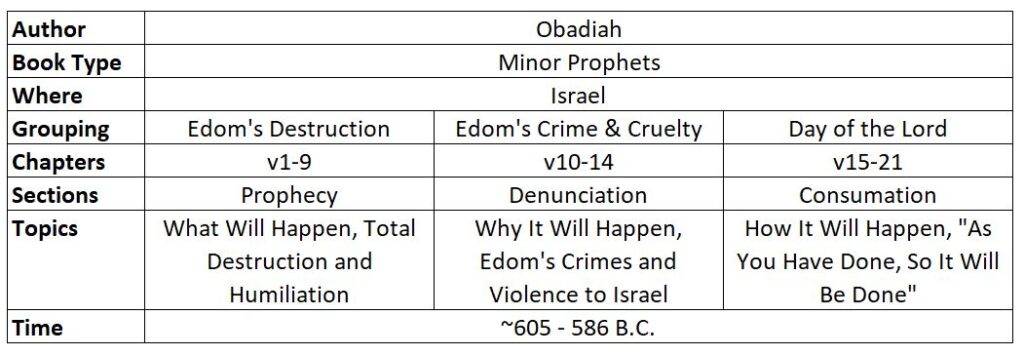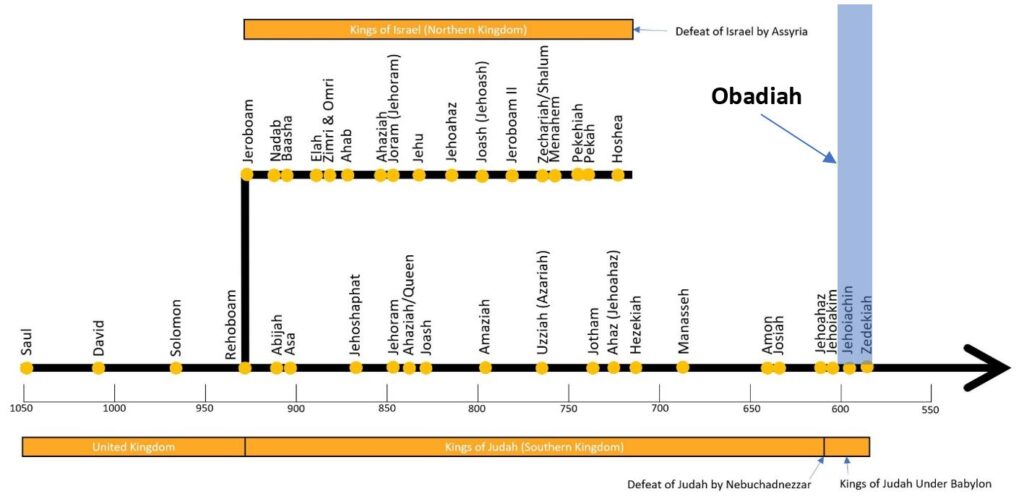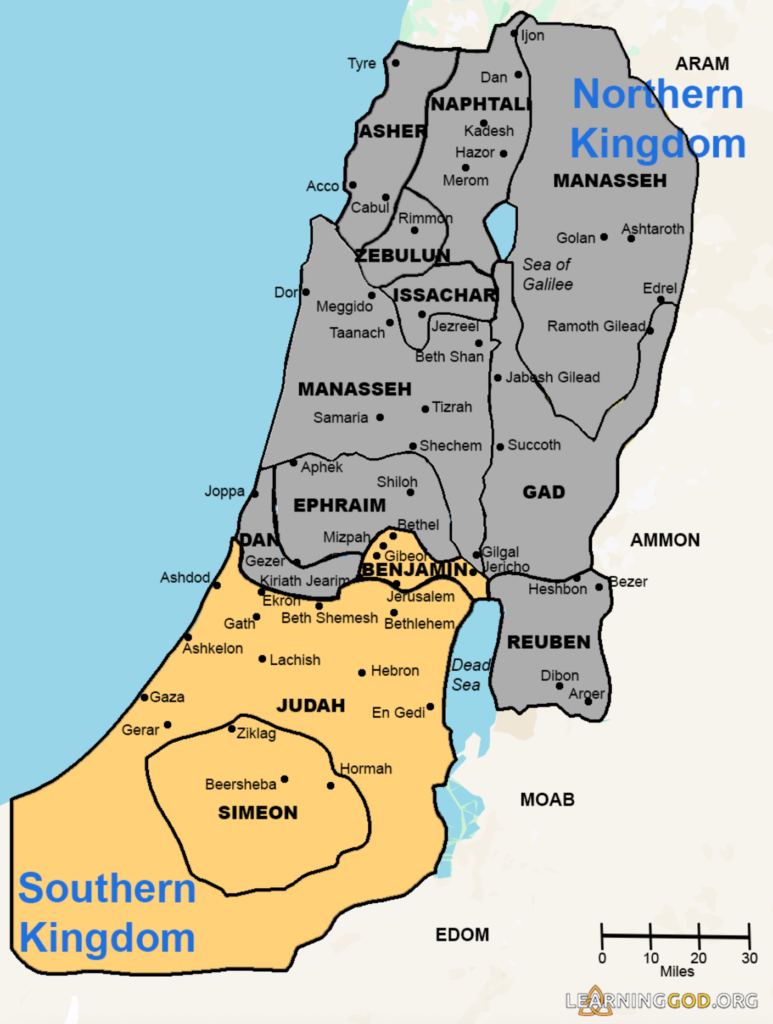Obadiah
The Doom of an Evil Nation
Summary | About | Why You Should Read it | Author | When Written | Context | Timeline | Location | Outline | Observations | Resources
Summary
The book of Obadiah is the shortest book in the Old Testament, consisting of just 21 verses. It is a prophetic text attributed to the prophet Obadiah, and its primary focus is on God’s judgment against the nation of Edom, which had long been in conflict with Israel.
Key Themes and Summary:
- Judgment on Edom: The main theme of Obadiah is God’s pronouncement of judgment against Edom for its arrogance, violence, and betrayal against Judah. Edom, a nation descended from Esau (the brother of Jacob), had a history of animosity toward Israel (descendants of Jacob). When Judah was attacked, Edom not only failed to help but actively participated in its downfall, which led to their condemnation.
- Divine Justice: Obadiah emphasizes the idea that nations and individuals will face consequences for their actions, particularly when they oppose God’s people. Edom’s pride and gloating over Judah’s misfortunes would lead to its own destruction.
- The Day of the Lord: Obadiah also speaks of a broader theme found in many prophetic books—the “Day of the Lord,” when God will judge all nations. This day will bring justice, particularly for those who have wronged Israel.
- Restoration of Israel: Toward the end of the book, Obadiah foretells the eventual restoration of Judah and the reestablishment of God’s kingdom. Israel will reclaim its land, and the Lord’s sovereignty will be established.
In summary, Obadiah is a prophetic message of judgment against Edom for its betrayal of Israel and a declaration of God’s ultimate justice, ensuring that Israel will be restored and God’s kingdom will prevail.
The following table provides a high-level look at the structure and contents of the book of Obadiah.

About
Obadiah is the 31st book of the Bible and the fourth of the book of the Minor Prophets in the Old Testament. It is the shortest book of the Old Testament.

Why You Should Read It
You will find several compelling reasons to read the book of Obadiah, despite its brevity:
- Understanding God’s Justice
Obadiah demonstrates that God holds all nations accountable for their actions. Edom’s punishment for its arrogance and betrayal serves as a reminder that God’s justice is impartial and applies universally. For Christians, this emphasizes that God is not only a God of love but also of justice, and that wrongdoing, particularly against God’s people, will ultimately be judged.
- Warnings Against Pride and Betrayal
The book emphasizes the dangers of pride, arrogance, and complacency. Edom’s downfall stemmed from its haughty attitude and sense of invulnerability. For Christians, Obadiah serves as a warning to avoid such pride and to treat others, especially fellow believers, with love and humility.
- The Sovereignty of God
Obadiah reinforces the belief that God is sovereign over all nations and history. No matter how powerful a nation may seem, it cannot stand against God’s plans. This can be an encouraging reminder for Christians that God is in control of the world’s events and will bring about His ultimate purpose.
- The Importance of Brotherhood
Edom and Israel were related as descendants of Esau and Jacob. Edom’s betrayal of Israel, despite their kinship, is condemned. This theme of brotherhood extends to Christian teaching, where believers are called to live in unity, love, and support for one another. Obadiah’s message of judgment against Edom highlights the serious consequences of failing to love and stand by one’s brothers and sisters in faith.
- Hope for Restoration
The book ends on a hopeful note, with the promise of Israel’s restoration and the establishment of God’s kingdom. This resonates with the Christian hope of Christ’s return and the ultimate restoration of God’s people in the new heaven and new earth.
- The Day of the Lord
Obadiah touches on the theme of the “Day of the Lord,” a day of judgment and salvation. For Christians, this connects to the New Testament teaching about Christ’s second coming and final judgment. It encourages Christians to live in light of eternity and remain vigilant in their faith.
In summary, reading Obadiah can deepen a Christian’s understanding of God’s character, particularly His justice and sovereignty, while offering important lessons on humility, unity, and hope for ultimate restoration.
Author
Obadiah, the author of the book of Obadiah, is one of the lesser-known prophets in the Bible. Unlike prophets such as Isaiah, Jeremiah, or Ezekiel, very little is known about him from the biblical text or historical sources. His name, which means “servant of the Lord” or “worshiper of Yahweh,” is common in the Old Testament, leading to some ambiguity about his identity.
When Written
Obadiah likely wrote this short book after the final siege, in which Edom was cheering on the Babylonians and then swooping in to take the spoils left behind.
Context
The book of Obadiah was written in the context of a historical conflict between the nations of Israel (Judah) and Edom. To fully grasp the book, it’s helpful to understand the broader historical, political, and theological background.
- Historical Conflict Between Israel and Edom
Edom’s Origins: Edom was descended from Esau, the brother of Jacob (also known as Israel). This sibling relationship was fraught with tension from the beginning, as Esau and Jacob were rivals. This enmity was passed down to their descendants, leading to generations of hostility between the two nations.
Edom’s Role During Judah’s Fall: One of the key events referenced in Obadiah is Edom’s actions during the destruction of Jerusalem by the Babylonians, likely around 586 B.C. (though some scholars debate the exact date). When Babylon invaded Judah, Edom either actively participated in or stood by and rejoiced over the downfall of their “brother” nation. They may have looted Judah’s cities, captured fleeing Israelites, or aided Babylon in some way. This betrayal of a close relative, especially at such a vulnerable time, is a central issue addressed in Obadiah.
- Judah’s Destruction and Exile
The Southern Kingdom of Judah, including Jerusalem, fell to the Babylonian Empire in 586 B.C. This was a time of immense national crisis for the Israelites. Their capital city, Jerusalem, was destroyed, the temple (their central place of worship) was razed, and many of the people were taken into exile. This catastrophe led to deep theological reflection on why God allowed His people to suffer such a fate. In this chaotic period, the Edomites, rather than aiding their neighbors or relatives, took advantage of Judah’s downfall.
- Prophetic Context of Judgment
Obadiah’s Prophetic Message: Obadiah speaks into this specific context of betrayal. His message is directed toward Edom, proclaiming God’s judgment on them for their pride and for participating in the destruction of Judah. Obadiah accuses Edom of gloating over Judah’s misfortune and taking part in plundering the remnants of the kingdom.
Divine Retribution: In ancient Israel, there was a strong belief in divine justice, particularly in the form of “measure for measure” punishment. Since Edom had taken advantage of Judah’s misfortune, they too would face destruction. The prophecy predicts Edom’s total devastation and ultimate ruin.
- Political Landscape
During the time of Obadiah, the Middle East was under the dominance of great empires like Assyria, Babylon, and later Persia. Small nations like Judah and Edom were caught between these powers, often forming alliances and exploiting each other’s vulnerabilities. Edom had remained relatively secure during the Babylonian attacks, leading to a sense of pride and complacency, which Obadiah directly condemns.
- Theological Context
Covenant and Judgment: The book fits within the broader theme of Israel’s understanding of the covenant between God and His people. Although God allowed Judah to be disciplined through exile because of their own sins, He also held other nations accountable for how they treated His people. Edom’s betrayal, given their shared ancestry with Israel, was seen as a violation of brotherhood and loyalty, which deepened their guilt.
The Day of the Lord: Obadiah also fits within the larger prophetic tradition of warning about the “Day of the Lord,” a time when God would bring judgment on the nations and establish His justice. For Edom, this meant a specific judgment, but for all nations, Obadiah envisioned a future day when God would set all things right.
- Date of Writing
While the exact date of the book is debated, the most likely period is sometime after the fall of Jerusalem in 586 B.C., when the betrayal by Edom would have been fresh in the minds of the Israelites. Some scholars place it earlier, during other conflicts between Judah and Edom, but the Babylonian destruction of Jerusalem fits the content of Obadiah most closely.
In conclusion, Obadiah was written in a context of national betrayal, political upheaval, and theological reflection during and after the fall of Jerusalem. It addresses the themes of justice, divine retribution, and the consequences of pride and violence, particularly in the way nations relate to one another.
Timeline
The timeline below shows from the beginning of the monarchy with Saul through the start of the Exile. Obadiah takes place in after the initial siege and fall of Jerusalem to Babylon to the time of the final siege, between 605 and 586 B.C.

Location
Obadiah was a prophet to the Southern Kingdom of Judah.

Outline
| I. Title and Introduction (1:1) |
| II. Judgment on Edom (1:2) — (1:14) |
| A. Edom’s Destruction Announced (1:2) — (1:7) |
| 1. The humbling of her pride (1:2) — (1:4) |
| 2. The completeness of her destruction (1:5) — (1:7) |
| B. Edom’s Destruction Reaffirmed (1:8) — (1:14) |
| 1. Her shame and destruction (1:8) — (1:10) |
| 2. Her crimes against Israel (1:11) — (1:14) |
| III. The Day of the Lord (1:15) — (1:21) |
| A. Judgment on the Nations but Deliverance for Zion (1:15) — (1:18) |
| B. The Lord’s Kingdom Established (1:19) — (1:21) |
Observations
- The Book of Obadiah is the only one chapter book in the Old Testament.
- Obadiah is the shortest book in the Old Testament.
- Obadiah probably lived in the Southern Kingdom of Judah.
- There are thirteen Obadiahs in the Old Testament.
- No kings are mentioned in Obadiah.
- Some believe Obadiah may have been a contemporary of Elisha.
- Obadiah may have been the earliest of the writing prophets.
- Concerning Edom:
- Edomites were descendants of Esau.
- Edom means “red” because of the color of the stew Esau traded his birthright for.
- Edomites lived in the mountainous area of Seir, south of the Dead Sea.
- The Edomites were bitter enemies of the Jews.
- Edom refused Moses’ request to allow the Israelites to pass through their land on their way to Canaan.
- The Edomites opposed Saul but were subdued by David.
- The Edomites fought against Jehoshaphat.
- The Edomites rebelled against Jehoram.
- In time Edom was controlled by Assyria and Babylon.
- In the 5th century B.C. the Nabateans forced the Edomites to leave their native country. The Edomites moved to the southern part of Palestine and became known as the Idumeans.
- Herod the Great was an Idumean.
- Became King of Judea under Rome in 37 B.C.
- Herod killed the male infants in Bethlehem in an attempt to kill Jesus.
- The Idumeans took part in the rebellion of Jerusalem against Rome and were defeated along with the Jews when Titus conquered Jerusalem in 70 A.D. NOTE: It is of interest to note that while the Edomites applauded the destruction of the Temple by the Babylonians in 586 B.C., a number of them died trying to defend it form the Romans in 70 A.D.
- Obadiah prophesied that:
- Edom would be “cut off forever” (10).
- “And no survivor shall remain of the house of Esau” (18).
- With the destruction of Jerusalem in 70 A.D., they disappeared from history.
Old Testament
New Testament
Free Resources
Other Resources
- x
